| Columns Retired Columns & Blogs |
Great article.
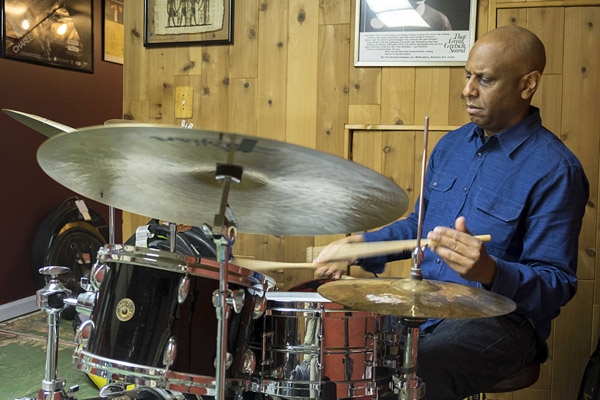
Billy is Professor of Jazz Drums at Juilliard and NYU, and he also accepts students at home. After lessons he often invites students to hear vinyl on his Basis Audio turntable, Audio Research amplification, and Magnepan speakers setup. The visiting 20-year-olds are often as confused as they are impressed.
"I've had students listen to my stereo," Drummond explains, "and when I flip the record over they ask 'Why are you doing that?' I say 'To play the other side.'
They reply "What? What 'side'? That doesn't make any sense."
I have to explain to them that a record has two sides, "A and B."
"But can't you just . . .?"
"No. You can't just push a button. You have to flip the record over."
Drummond has recorded three albums as a leader (Native Colours, The Gift, Dubai; all Criss Cross Records), ten as a co-leader, and at least 300 albums as a sideman, including Stereophile's first jazz album, Rendezous (now out of print, though one track, "The Mooche," can be found on Editor's Choice). When not recording (often at David Chesky's studio in New York) or touring globally with Steve Kuhn, Eddie Henderson, Stanley Cowell or his own group, Drummond can be heard performing locally in the Tri-State area.
Drummond's basement studio is chock-full with snare drums and cymbals—three of his prized ride cymbals bear the autographs of his heroes: Max Roach, Jack DeJohnette, and Tony Williams. Also in Drummond's studio lair, framed photos of historic rhythm masters look out over two well-used Gretsch drum sets.
Back upstairs in an unused bedroom, one of Drummond's stereo systems is literally two rigs functioning as one, with two different front ends powering Magnepan MG1.6/R speakers. Drummond's basement was flooded in early 2016, so he merged two systems together (a pair of Snell monitors remains downstairs).
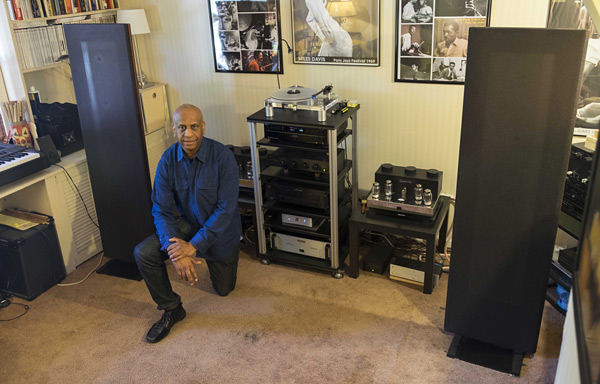
Part one of the bedroom system includes the following source components: Technics SL-1200 Mk.2 Anniversary Gold Turntable with Audio Technica AT120ET cartridge; Sony SCD-CE775 SACD changer; Sony CD/recorder; Oppo DV-980H Universal Player; and California Audio Labs Sigma II tube DAC. An Audible Illusions Modulus 3A preamplifier feeds Quicksilver V4 Mono Amplifiers. Kimber, Straight Wire, AudioQuest, and Nordost comprise cabling; AudioPrism Ground Control and Tripplite, Adcom and Monster Power handle line conditioning.
In the second part the bedroom system, components include a Basis 1400 turntable/Rega RB300 arm/Ortofon Quintet Blue cartridge to the Audible Allusions Modulus 3A preamplifier and Audio Research 150.2 stereo power amp. Digital is handled via PS Audio Digital Link III DAC, Audio Research CD-1 CD player, and Sony SCD-555ES SACD changer. Symposium Roller Blocks support the Audio Research components. Cabling from AudioQuest, Lifatec, SilverSmith, Straight Wire and LessLoss and a Shunyata Research Hydra 4 conditioner complete part two. Whew!
Listening to Jack DeJohnette's Special Edition (ECM), Barry Harris's At The Jazz Workshop (Riverside) or Paul Motian's Le Voyage (ECM) on the Basis turntable-fed system sounded shockingly good in the bedroom! Hearing DeJohnette's drumming through Drummond's large Maggies was a revelation. The speakers' excellent imaging, superb transparency, effortless speed and life-sized soundstage made these familiar recordings a fresh listening experience. If Drummond ever tires of the music biz, he can put his meticulous tweaking skills to good work.
Guided by John Rutan of Verona, New Jersey's Audio Connection and StereoTimes's Clement Perry (a close neighbor), Drummond has successfully tweaked his systems, each decision impacting the sound quality. The sonic differences were palpable when switching between the Sony SACD and Audio Research CD players.
"On the Sony SACD player I'm using a Lifeatec TosLink cable to the DAC, and a Silversmith RCA cable from the Audio Research CD player to the DAC," Drummond explains. "The two sound very different. I like the attributes of the TosLink; it's a little bit faster because it's glass. The RCA cable is silver, so it's different-sounding again. And Lifeatec's cable is not that expensive, $70 a meter."
Why Maggies?
"They're open; they're fast; they're detailed," Drummond replies. "They have a huge soundstage; they image well; they're non-fatiguing. They don't have a box so they're not colored. They're dipoles, so they fire front and back.
"I like their speed for the drums," Drummond continues. "There's something special about the way a Magneplanar handles drums and cymbals. Maybe it's because the surface area is larger than a small cone. When you hear a drum through the Maggies you're hearing the drum. And because these are so fast they really get the cymbal sound right. That's been a key factor for me in choosing a speaker. If it doesn't get the cymbals right I'm not happy." (Laughs)
Billy, what is an audiophile and are you one?
"I don't know about all that!" he replied. "That's a name that somebody else gave people like us. I am someone who enjoys listening to music on high performance playback equipment. As opposed to someone listening to music on equipment that is not high performance and someone who might not be interested in extracting the most information the recording actually has on it. I am interested in that. I don't know what you call that. You can call that whatever you want." (Laughs)
Why are most musicians generally not audiophiles, or "high-performance playback" aficionados?
"Most musicians can get it without it being high-performance playback level," Billy says. "But most musicians that hear my rig are completely floored and want to get into it. I have turned students on to it; those are young people in their 20s. They're stunned hearing this. They're used to hearing music on earbuds or computer speakers. They have no clue; they've never experienced that connection to the physicality of the process. But at my place they get the bug."
In Drummond's living room, situated in front of wall-mounted photos of Billy with Sonny Rollins, Billy with Hillary Clinton, and Billy with President Obama, system two holds court.
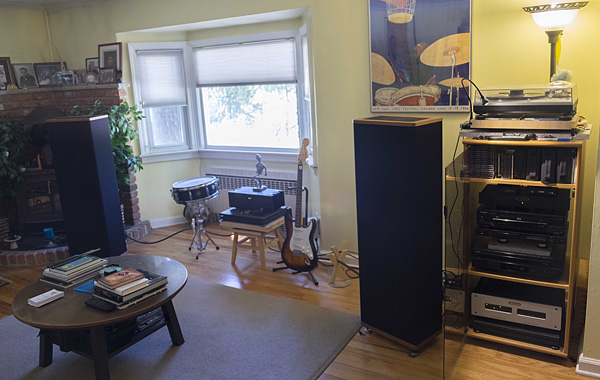
Analog from Technics SL-1200 Mk.II turntable with Audio Technica MLA440 cartridge is contrasted by Pioneer/Oppo/Yamaha CD players signaling a MicroMega MyDAC, all into Audio Research SP16 preamplifier and Bryston 3B ST stereo power amp juicing Vandersteen 3A Signature loudspeakers. Straight Wire interconnects and speaker cables, Tempo Electric Big Twist Silver interconnects and Klee coaxial digital cable comprise connectors. Adept Response RPT 2 and Akiko Audio E-Tuning Gold Mk.II power conditioners and an Acoustic Revive RR-77 RR77 Schumann Resonator close system two. The sound here was extremely musical and warm, with no syrup in earshot!
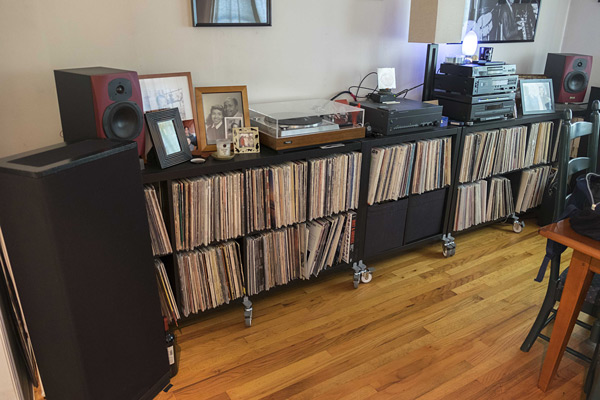
Now to the dining area, where system three, "hobbled together from leftover pieces," includes Technics SP-10 turntable with Audiocraft tonearm, Pioneer DV45A Universal player, MSB Digital Link DAC, Nakamichi DR2 cassette player, NAD C370 integrated amplifier, Tannoy Reveal monitors and Vandersteen 2CE loudspeakers. System three, framed around Drummond's LP collection, played solid musical pleasure.
Billy, how does your inner audiophile influence your outer musician?
"I didn't say I was an audiophile!" Billy laughs. "But maybe it helps me to sonically hear the people that I am aspiring to be like or become musically. High performance playback equipment helps me get closer to my ideal. Aside from hearing the musicians play live—and there is nothing like the live performance—I can get closer when I extract the information from the disc or the records. Then I can hear clearly the sounds of these people playing their instruments. And that's something that I am in touch with. It's all about sound. We're trying to get the best sounds we can from our instruments. We like musicians for their unique and different sounds. I like being able to differentiate between those different sounds."
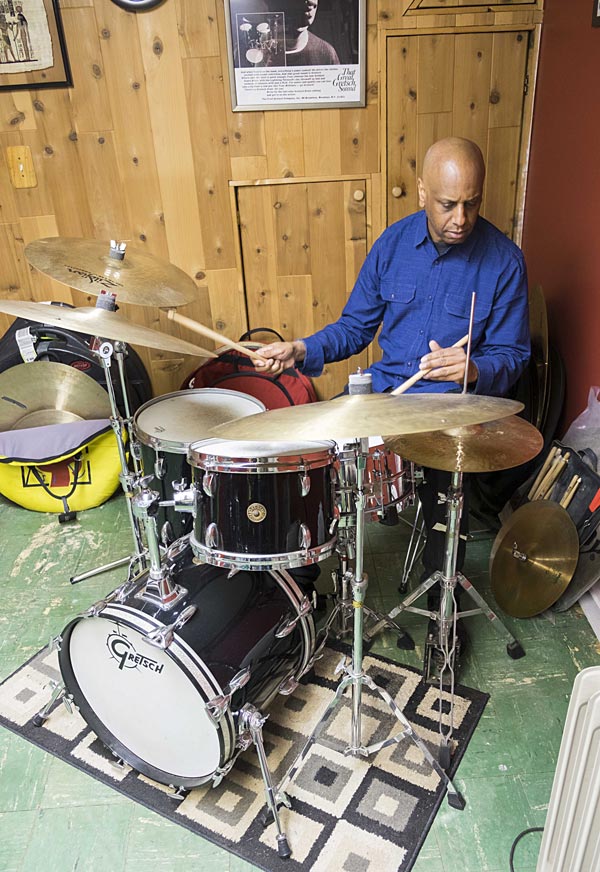

Thanks a million!
That was amazingly interesting!

Bravo! very well written and nice pics to boot. I, for one, enjoy reading these types of articles. Keep up the excellent work.

More articles like this please. Loving the photos too!

Please make this a series of articles.

Years ago when I bought my LP-12 I compared it to a Xerxes and Delphi - played through Maggies at my then fav hi-fi store (has since shuttered). It was fascinating to see how musical the Scottish table was through the Maggies in comparison to the others which sounded way too analytical and un-musical through the same speakers. The man knows his hi-fi and has matched his gear very well. Great article.

It's the same one I have and I love it. (Basis Audio 1400)

I assume it is because musicians tend to be strong on the "feeling" side of things and not so much an the "analytical" side of music (and everything else, really). Audiophiles by definition have a strong analytical approach (no matter how "subjective" they think it all is in the end). Mr. Drummond is also a professor so he has to be analytical to a certain extant of course. Somehow, I can't imagine Jim Morrison ever having had a hi-fi or teaching anything...

Jazz and classical musicians are very analytical. They have to learn music, memorize it, forget it, recreate it, and improvise on it. This all requires a high degree of analytical ability. Lotsa jazz musicians/audiophiles in NYC.

what Renee Rosnes' home audio set-up is like.

We had a very enjoyable visit with Billy at The Gramophone in Edmonton this past spring. He is extremely interested in hifi as the article makes clear and we offered him a sales position in the store should politics in America make life difficult for him and many other Americans. It was an honour to meet him.

That depends - do you teach at Julliard and have won Grammy Awards?
We'll see if we can put you on the list to get in before the Northern Wall is built.
Good Luck in November - feel the burn.